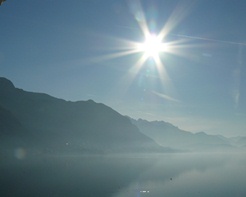Winter Olympic Decision on Ice for Now

Climate change is the new reality for the IOC and the Olympic Winter Games.
The decision by the IOC Executive Board to postpone a decision on the 2030 Winter Games from 2023 to the next year is the first significant step the IOC is taking to dodge the trouble of finding hosts for the event as winters continue to warm.
Sometime next year the IOC is expecting to receive the findings of a report commissioned in the December meeting of the EB.
Still needing more detail on scope and process, the report is supposed to address the fundamental challenge of finding suitable hosts that deliver sustainable Games with weather that’s cold enough for outdoor events.
IOC Olympic Games Executive Director Christophe Dubi indicated that the use of existing facilities will be a key requirement. It’s tacit recognition that there is little appetite anywhere in the world these days for massive construction projects in support of a Winter Olympics.
And neither does the IOC want controversy over deforestation, so existing ski runs are another must to meet sustainability requirements.
Layer that with reliable cold weather and snow, the roster of countries that can deliver today are but a handful, all a result of hosting previous Games. From North America there’s the U.S. and Canada. Japan and China are plug and play ready from Asia.
Europe has the biggest contingent: Austria, France, Germany, Italy, Norway, Russia and Switzerland
That’s 11 countries in all. With Sapporo and Salt Lake City believed to have the inside track for 2030 and 2034, the IOC hopes those two experienced hosts will provide a smooth start to the still to be new rotation for the Winter Games defined rotation. Indeed, still to be confirmed is whether to make a joint award for 2030 and 2034. IOC President Thomas Bach who a few months ago said the selection of the 2034 Winter Games host should be handled by his successor, appears to have adjusted his thinking now in favor of the twin awarding.
But where to go from there? If the next three Winter Games go to Europe, Asia and North America in that order, then Europe would seemingly be the next in line for 2038. With the largest number of possible sites, the IOC surely should be able to find a European host to keep the rotation in motion.
Politics have laid waste to a litany of bids from Europe in the 21 st century, largely over fears of financial risk. A reset of how the Winter Games are chosen and delivered may be the right button for the IOC to push in its chronicle struggles against Olympic-phobia. Not just
in Europe, but everywhere.
Bach’s forward thinking Olympic Agenda 2020+5 program is meant to be a reset of all aspects of the IOC’s work as it closes the first quarter of this new century. It’s a why not approach that opens the door to consider drastic changes such as those needed for the Winter Games.
The IOC has yet to identify the composition of the team which will produce the report. IOC member Octavian Moriaru is expected to play a big role as chair of the Future Winter Games commission. Federations and NOCs will want their say on how an orderly rotation of Winter Olympic hosts might work.
Sponsors and broadcasters would want to know more, too. Plugging scientific expertise into the report will also be critical.
While optimists will look to the future and see a second century of Winter Olympics glory ahead, the experts may not be as upbeat. The battle against global warming is far from being won. The IOC report next year may become another wake upcall to the world about the consequences ahead from climate change

